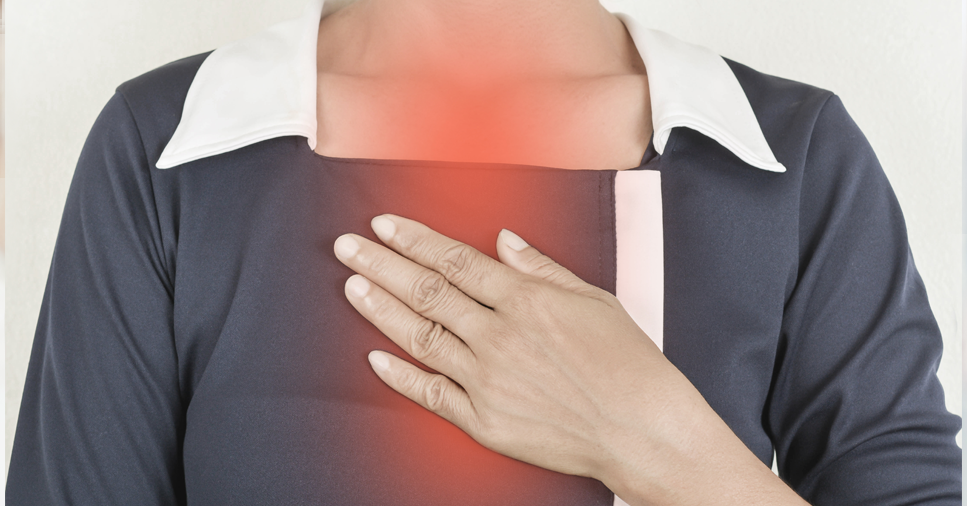Heartburn is common, but it can also be quite serious
Heartburn is the burning feeling you get in your chest when food in your stomach backs up into your esophagus. Unfortunately, heartburn is extremely common, with an estimated 60 million Americans experiencing heartburn at least once a month. Nearly 15 million Americans experience heartburn every day.
When you feel heartburn, it means you have gastroesophageal reflux. The reflux is acidic stomach juice that’s flowing back up into your esophagus. It irritates the delicate lining of your esophagus and can be painful. The acid reflux backs up into your neck and throat. Frequent acid reflux is known as gastroesophageal reflux disease (GERD).
Causes of heartburn
If you have heartburn, you may produce too much acid in your stomach. Your digestive system might have structural issues that let acid back into your esophagus. There are also foods and lifestyle choices that can exacerbate your risks and symptoms, including:
- Alcohol
- Cigarettes
- Spicy, greasy and fried foods
- Acidic foods (citrus, tomatoes)
- Fatty foods (chocolate, dairy, meats)
- Medications (aspirin, ibuprofen, naproxen)
- Acidic beverages (coffee, carbonated drinks, juices)
Acidic juices can damage your esophageal lining but not your stomach. The juices in your stomach help your body digest foods. The juices contain hydrochloric acid. Your body naturally protects your stomach from this strong acid. Your esophagus is not protected.
In addition, if you smoke, you’re reducing the amount of saliva your body creates. Saliva is one of the natural protective barriers of your esophagus. If you smoke and have GERD, symptoms can be more severe.
Heartburn symptoms
Heartburn symptoms typically appear after eating. If you lie down after a meal, it can feel even worse. If you have any of the following symptoms after a meal, you may have heartburn, acid reflux or GERD:
- Bad breath
- Persistent dry cough
- Swallowing difficulties
- Tooth enamel damage from acid (GERD)
- Sour or bitter taste in your mouth and throat
- Burning sensation and pressure in your breastbone
Heartburn or heart attack?
Symptoms of severe heartburn and those of a heart attack can often overlap, but you can usually tell you have heartburn if you experience a burning sensation in your upper abdomen and chest, accompanied by a sour taste in your mouth. The most common and similar symptom of heartburn and a heart attack is the chest pain or discomfort. Other symptoms that may be a more likely indication of heart attack (vs. heartburn) are listed below:
- Cold sweat
- General fatigue
- Shortness of breath
- Nausea or vomiting
- Heartburn symptoms
- Sudden lightheadedness
- Pressure or pain in your chest, arms, neck, jaw or back
With heartburn, you may feel like food is coming up into your mouth. It’s a different sensation than vomiting, but severe heartburn can also cause you to vomit. If you’re not sure if you’re experiencing heartburn or a heart attack, seek immediate medical care.
Serious side effects of heartburn
Even if it’s not a heart attack, heartburn can be serious. Dangerous side effects and complications can result if you don’t seek treatment. Some common side effects include:
- Awaking from sleep, especially if you’ve eaten within two hours of going to bed
- Esophageal cancer: if Barrett’s esophagus is not treated
- Esophagus erosion: scarring, ulcers and narrowing of the tube
- Barrett’s esophagus: precancerous condition from chronic acid reflux
- Esophageal strictures and dysphagia: swallowing difficulties due to esophagus damage
Heartburn diagnosis
Your doctor may refer you to a gastroenterologist who can evaluate the severity of your symptoms. To determine if your case is mild, or has potentially damaged your esophagus, there are three common tests your doctor may request:
- Endoscopy: Examining your esophagus and stomach with a small, flexible tube that goes through your nose
- Upper GI series: Examining how a liquid mixture travels through your esophagus and stomach while X-rays are taken
- Esophageal Manometry (Esophageal pH): Examining your esophagus and stomach functions with a small, flexible tube through your nose
You will likely be able to take sedatives when you have tests that involve inserting a tube into your nose. These help keep you calm.
Heartburn treatment
Treatment for heartburn depends on how mild or severe it is. If it’s mild, you can often reduce or eliminate symptoms by taking some antacids and elevating your upper body.
Treatment for more severe heartburn, such as acid reflux or GERD, involves medicines to reduce acid in your stomach. Your doctor may also recommend losing weight, drinking less alcohol and stopping smoking. In extreme cases, you might need surgery to tighten part of your esophagus.
Is your heartburn more than uncomfortable? Visit Mercy.com to find the treatment that’s best for you.






